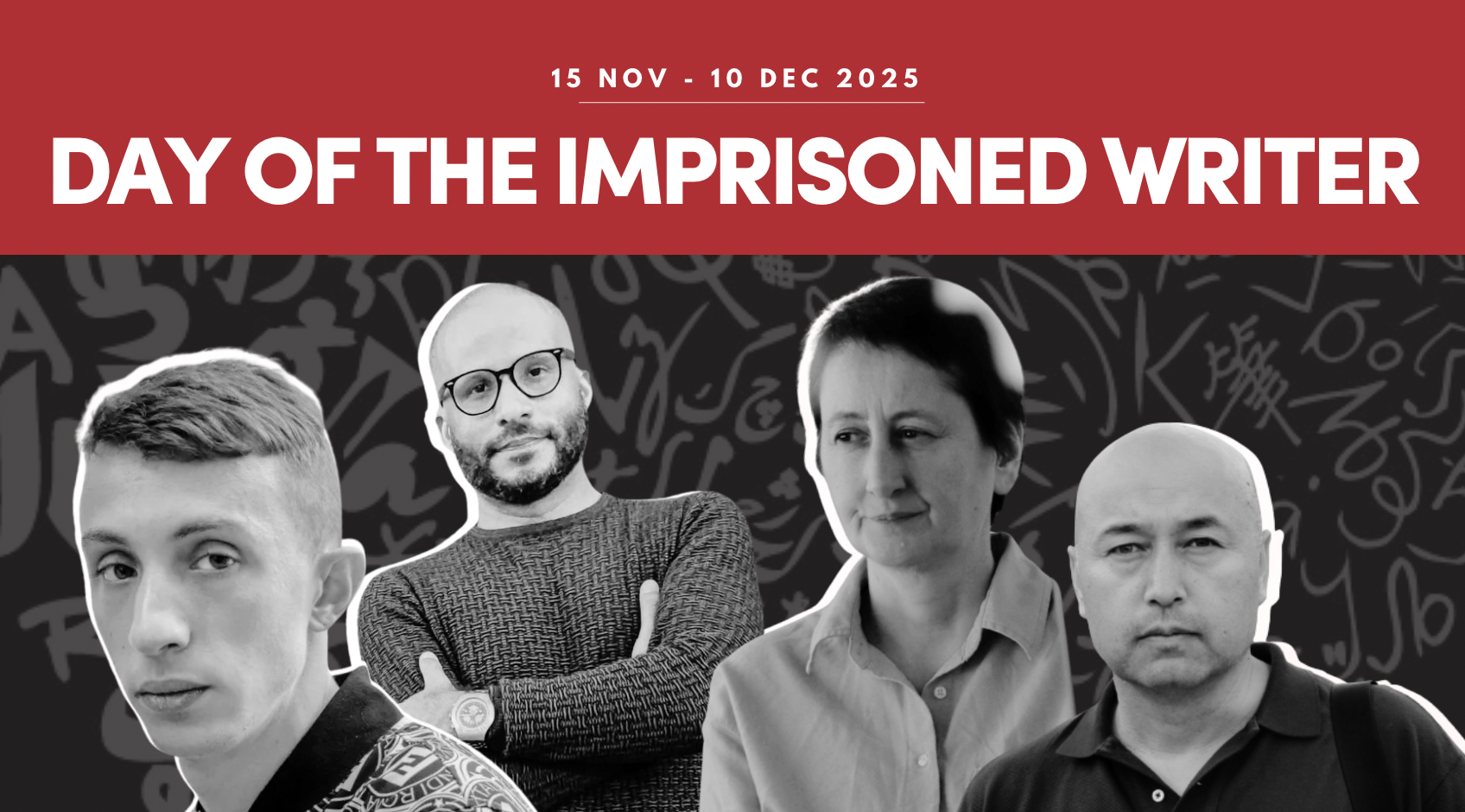Courage Day (also called International Day of the Imprisoned Writer) is observed on the 15th of November each year.
 Why Support Courage Day?
Why Support Courage Day?
Courage Day (also known as The Day of the Imprisoned Writer) recognises writers who defend the right to free speech, and those who suffer oppression and are killed/imprisoned for their work.
PEN International – Day of the Imprisoned Writer

Images from left to right: Mohamed Tadjadit (Lydia Saidi) , Rory Branker (La Patilla) , Mzia Amaglobeli (Zurab Tsertsvadze) , Yalqun Rozi (Kamaltürk Yaqun)
https://www.pen-international.org/news 
NZSA commemorates The Day of the Imprisoned Writer – Courage Day.
THE EMPTY CHAIR
An ’empty chair’ is used at conferences to remind authors of the importance of freedom of expression/speech. The ’empty chair’ represents writers imprisoned for their work, and features a brief bio of one author.
For further information on PEN or any issues or concerns raised above please contact the NZ PEN Representative at PEN@nzauthors.org.nz
Courage Day – Day of the Imprisoned Writer
What is the ‘Empty Chair’ Campaign?
There is something evocative about an empty chair. It can symbolise many things. The solitary life of a writer. The fact that with the revolution in publishing, much writing today is never destined for public consumption.
Or it can symbolise something more powerful; the plight of the estimated 700-900 writers around the world who are imprisoned for their work.
The chairs at PEN’s International Congress represent imprisoned writers whose absence from the conference was ‘emblematic of challenges faced by their colleagues.’
Writing is a solitary business. It is also a dangerous one.
Day of the Imprisoned Writer is observed annually on November 15, raising awareness about censorship, harassment, and persecution of writers and journalists worldwide. Censorship is a growing problem today, with many government agencies spying on their citizens, especially vocal anti-government critics, whistleblowers, and political activists. In some countries, freedom of the press is non-existent, and independent journalism results in arbitrary detention. Human rights organizations and groups dedicated to protecting free speech distribute banned materials in some parts of the world. They also invite advocates, writers, and reporters to discuss the state of independent journalism and free speech.
HISTORY OF DAY OF THE IMPRISONED WRITER
Day of the Imprisoned Writer started in 1981 and was the product of PEN International’s Writers in Prison Committee. Since its introduction, PEN has used the holiday to call for the release of imprisoned writers, advocate for better protection for journalists and activists, and fight for justice for those writers who gave up their lives in the ultimate sacrifice to preserve the truth. Despite enduring the same threats, intimidation, and intrusive surveillance from state authorities, poets, translators, publishers, and novelists are honored for their contributions to the cause. PEN coordinates activities through more than its 100 centers worldwide.
Each year, PEN lists five writers persecuted or imprisoned by their governments. These writers come from different parts of the world but are constantly engaged in reporting or investigating stories involving corruption, violent crimes, illegal spying, police cover-ups, and state-sponsored violence. In 2009, PEN named Liu Xiaobo and Natalia Estemirova on their list of writers. Xiaobo, a dissident writer, later died in detention in 2017. Estemirova was abducted and murdered by unknown persons in 2009 while she was investigating war crimes in Chechnya.
In 2018, PEN joined the rest of the human rights and free speech-oriented organizations in condemning the murder of journalist Jamal Khashoggi at the Saudi Arabian consulate in Istanbul. Through the “America Senior Director of Free Expression,” PEN called for the Saudi authorities to produce Khashoggi and hold the persons responsible for his murder accountable. On Day of the Imprisoned Writer in 2021, PEN named Chinese scholar Rahile Dawut, U.A.E. human rights lawyer Mohamed Al-Roken, Turkish politician Selahattin Demirtaş, Cuban musician Maykel Osorbo, and a collective case of 12 Eritrean writers imprisoned for 20 years incommunicado. PEN International remains dedicated to supporting poets, playwrights, editors, essayists, and novelists worldwide.
Writing: A Dangerous Business
According to Reporters Without Borders, a total of 720 journalists have been killed since 2005. Last year alone saw 66 killed, 178 imprisoned, and 119 kidnapped. One need look no further for visual reminders that the written word is still powerful than the beheadings by ISIS of freelance journalists James Foley, Steven Sotloff, and Japan’s Kenji Goto.





